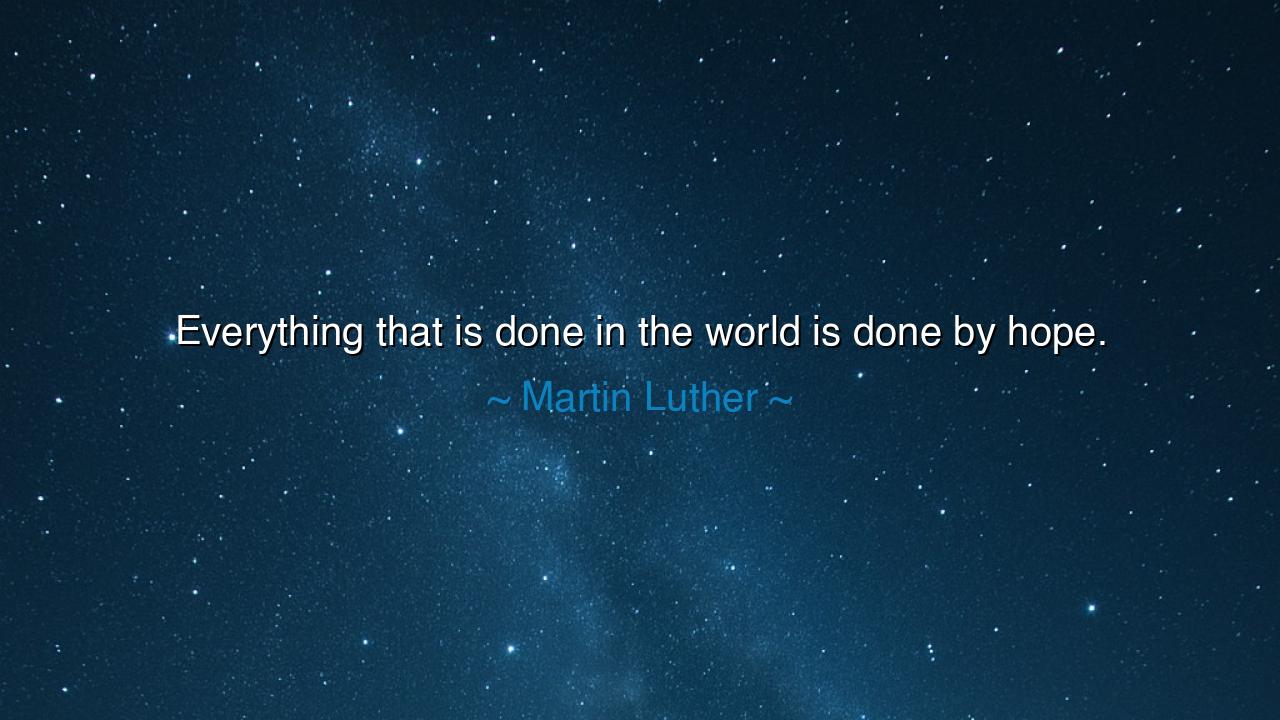
Everything that is done in the world is done by hope.






In the age of faith and fire, when courage and conscience stood against empire and tradition, Martin Luther — the monk who set nations ablaze with truth — spoke words that have echoed through centuries: “Everything that is done in the world is done by hope.” In these few words lies the heartbeat of human endeavor, the invisible force that has moved kings, artists, rebels, and saints alike. For hope is the quiet architect behind every great deed. It is the seed of every invention, the breath of every prayer, the light that leads humanity from the shadows of despair into the dawn of possibility.
Luther, who lived through storms of faith and persecution, did not speak of hope as a mere sentiment or wish. He spoke as one who had faced the abyss of fear — who had stood before the mighty powers of the world and declared his conscience captive to God alone. For him, hope was not a luxury; it was survival. It was the fire that kept his hand steady as he wrote words that would challenge empires and awaken a sleeping world. When he said that “everything that is done in the world is done by hope,” he meant that no act of creation, courage, or change can exist without that sacred spark that whispers, “There is something beyond this.”
Consider the meaning of this truth in the story of humanity itself. When the first explorers sailed into uncharted seas, they did so not by sight but by hope — the belief that land lay beyond the horizon. When inventors bent over their workbenches, breathing life into machines no one else could imagine, it was hope that guided their hands. Even in the darkest hours of history — when wars raged, when nations fell, when tyranny sought to choke the human spirit — it was hope that refused to die. In the concentration camps of World War II, amid horror and hunger, some prisoners still whispered songs of faith. They held to the hope that one day the sun would rise again. And that hope, intangible though it was, gave them strength greater than chains or guards.
For hope is the mother of all action. The farmer sows because he hopes for harvest. The healer labors because he hopes to cure. The teacher speaks because she hopes her words will ignite a mind. The artist paints, the builder builds, the lover forgives — all because they believe in the possibility of renewal. Without hope, there is paralysis; with hope, even the broken can rise. It is the soul’s most powerful fuel, and it burns quietly in the heart of every act that gives life meaning.
The ancients understood this well. In Greek myth, when Pandora opened her fateful jar and released every sorrow into the world — disease, envy, greed, death — one thing remained at the bottom: Hope. The gods, though they had unleashed suffering upon mankind, left hope as the balm that could heal all wounds. And through every age since, hope has been humanity’s companion in adversity — the one treasure that cannot be stolen or destroyed, no matter how dark the night. Luther, steeped in scripture and the wisdom of the ancients, echoed this eternal truth in his own way. He saw that it was hope that moved the reformer to speak, the believer to pray, the oppressed to resist, and the sinner to begin again.
Yet hope, as Luther knew, is not passive. It is not idle wishing or soft comfort. It demands action. True hope is faith made visible — the belief that things can change, followed by the courage to make them so. The builder who dreams of a cathedral must lift the first stone. The oppressed who dream of freedom must take the first step. The one who hopes for forgiveness must first open their heart. Hope without effort is fantasy; hope joined with effort is creation. Luther’s own life was proof — for his hope in truth was not a quiet dream, but a roaring call to reform the world.
So, my child of the future, remember this teaching: let hope be the light that guides your every act. When despair tempts you to stillness, let hope command your hands to move. When fear whispers that all is lost, let hope speak louder, saying, “Try once more.” Do not despise small hopes — they are the sparks that ignite the stars. Feed them with action, protect them with faith, and they will grow into the fire that shapes destiny.
For indeed, as Martin Luther taught, everything that is done in the world is done by hope. Empires rise and fall by it; love endures through it; and the very pulse of creation depends upon it. Let hope, then, be your first thought in the morning and your last companion at night. It is the invisible hand that builds every bridge, heals every wound, and calls forth from the silence of the human heart the eternal refrain: “The world is not finished — there is still more to come.”






AAdministratorAdministrator
Welcome, honored guests. Please leave a comment, we will respond soon